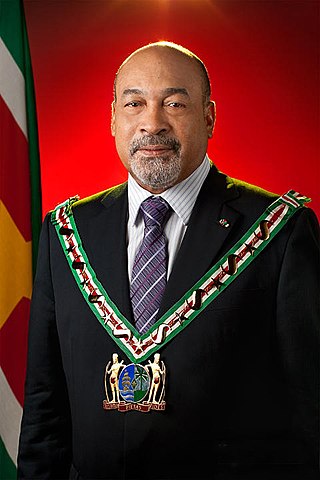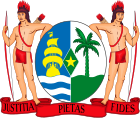The early history of Suriname dates from 3000 BCE when Native Americans first inhabited the area. The Dutch acquired Suriname from the English, and European settlement in any numbers dates from the 17th century, when it was a plantation colony utilizing slavery for sugar cultivation. With abolition in the late 19th century, planters sought labor from China, Madeira, India, and Indonesia, which was also colonized by the Dutch. Dutch is Suriname's official language. Owing to its diverse population, it has also developed a creole language, Sranan Tongo.

Desiré Delano Bouterse is a Surinamese military officer, politician, convicted murderer and drug trafficker who served as President of Suriname from 2010 to 2020. From 1980 to 1987, he was Suriname's de facto leader after conducting a military coup and establishing a period of military rule. In 1987, Bouterse founded the National Democratic Party (NDP). On 25 May 2010, Bouterse's political alliance, the Megacombinatie, which included the NDP, won the parliamentary elections, and on 19 July 2010, Bouterse was elected as President of Suriname with 36 of 50 parliament votes. He was inaugurated on 12 August 2010.

The president of the Republic of Suriname is, in accordance with the Constitution of 1987, the head of state and head of government of Suriname, and commander-in-chief of the Suriname National Army (SNL). The president also appoints a cabinet.

Henck Alphonsus Eugène Arron was a Surinamese politician who served as the first Prime Minister of Suriname after it gained independence in 1975. A member of the National Party of Suriname, he served from 24 December 1973 with the transition government, to 25 February 1980. He was overthrown in a coup d'état by the military, led by Dési Bouterse. Released in 1981 after charges of corruption were dropped, he returned to banking, his previous career. In 1987, Arron was elected as Vice President of Suriname and served until another coup in 1990 overthrew the government.

Elections in Niger take place within the framework of a semi-presidential system. The President and National Assembly are elected by the public, with elections organised by the Independent National Electoral Commission (CENI).

The National Assembly is the Parliament, representing the legislative branch of government in Suriname. It is a unicameral legislature. The assembly has been situated in the former park house at the Independence Square in Paramaribo, after a fire destroyed the old building of representation on 1 August 1996. A reconstruction of the old building was completed in 2022.

Ramsewak Shankar is a Surinamese politician who was the 4th President of Suriname, serving from 1988 to 1990. His government was overthrown by Dési Bouterse leading a bloodless military coup. Shankar had previously served as Agriculture & Fisheries Minister from 1969 to 1971.

General elections were held in Suriname on 25 May 2005. The governing New Front for Democracy and Development of president Ronald Venetiaan lost seats, remaining the largest party but failing to get a majority in the National Assembly of Suriname. Despite this Venetiaan was re-elected as president after obtaining sufficient support to win a majority in the election for president.

Jagernath Lachmon, also Jaggernath Lachmon, was a Surinamese politician. He was one of the founders of the Progressive Reform Party (VHP), an Indo-Surinamese party founded in 1947 of which he served as President until his death.

The vice president of Suriname is the second-highest political position in Suriname, after the president. The president and the vice president are elected by the National Assembly for five-year terms.

General elections were held in Suriname on 25 May 2010.

General elections were held in Malawi on 17 May 1994 to elect the President and National Assembly. They were the first multi-party elections in the country since prior to independence in 1964, and the first since the restoration of multi-party democracy the previous year. His Malawi Congress Party (MCP), which had governed the country since independence, was decisively beaten by the United Democratic Front (UDF).

The 1980 Surinamese coup d'état, usually referred to as the Sergeants' Coup, was a military coup in Suriname which occurred on 25 February 1980, when a group of 16 sergeants of the Surinamese Armed Forces (SKM) led by Dési Bouterse overthrew the government of Prime Minister Henck Arron with a violent coup d'état. This marked the beginning of the military dictatorship that dominated the country from 1980 until 1991. The dictatorship featured the presence of an evening curfew, the lack of freedom of press, a ban on political parties, a restriction on the freedom of assembly, a high level of government corruption and the summary executions of political opponents.

Johannes Samuel Petrus "Johan" Kraag was a Surinamese politician who served as the President of Suriname from 29 December 1990, until 16 September 1991.

Chandrikapersad "Chan" Santokhi is a Surinamese politician and former police officer who is the 9th president of Suriname, since 2020. After winning the 2020 elections, Santokhi was the sole nominee for president of Suriname. On 13 July, Santokhi was elected president by acclamation in an uncontested election. He was inaugurated on 16 July.
The Nationalist Republican Party was a political party in Suriname, existing from 1959 to 1980.

The 1990 Surinamese coup d'état, usually referred to as the Telephone Coup, was a military coup in Suriname on 24 December 1990. The coup was carried out by the acting commander-in-chief of the Suriname National Army (SNL), Police Chief Ivan Graanoogst. As a result of the coup, President Ramsewak Shankar was dismissed from power, and parliament and government were disbanded.

General elections were held in Suriname on 25 May 2020. The elections occurred concurrently with an economic crisis in Suriname, as well as the COVID-19 crisis.
The Progressive National Party was a political party in Suriname.













